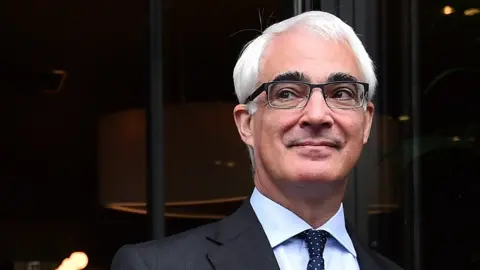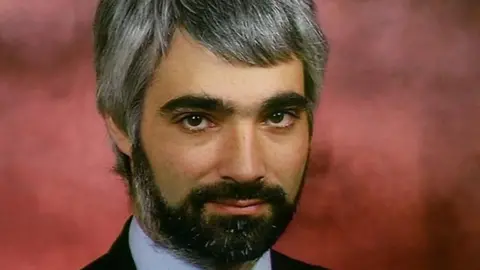Former Chancellor Alistair Darling dies aged 70
 Getty Images
Getty ImagesAlistair Darling, the Labour chancellor who steered the UK through the 2008 financial crisis, has died aged 70, a family spokesperson has said.
Following Labour's landslide 1997 election win, Lord Darling served in cabinet for 13 years under Tony Blair and Gordon Brown.
He was best known as the steady pair of hands who shepherded the UK economy as half its banking system collapsed.
The ex-Edinburgh MP died after a short spell in hospital, his family said.
A statement issued on behalf of his family called Lord Darling a "much-loved husband of Margaret and beloved father of Calum and Anna".
The family said he died in "Western General Hospital under the wonderful care of the cancer team".
Labour leader Sir Keir Starmer said Lord Darling "lived a life devoted to public service".
"I consider myself incredibly fortunate to have benefited from Alistair's counsel and friendship," added Sir Keir.
"He was always at hand to provide advice built on his decades of experience - always with his trademark wry, good humour."
The whole Labour movement felt a "profound" wave of shock, he added.
Mr Brown, who after becoming prime minister brought Lord Darling in as chancellor, said he was "deeply saddened" to hear of his death.
He told the BBC: "In times of crisis Alistair was the person you would want in the room because he was calm and he was considered and he had great integrity."
Tony Blair added his voice to the tributes, calling Lord Darling "a rarity in politics".
"I never met anyone who didn't like him. He was highly capable though modest, understated but never to be underestimated, always kind and dignified even under the intense pressure politics can generate."
Prime Minister Rishi Sunak said Lord Darling's passing "is a huge loss to us all", while Chancellor Jeremy Hunt described him as "one of the great chancellors", who did "the right thing for the country at a time of extraordinary turmoil".
Eradicate poverty
Alistair Darling was born in London in 1953 and but moved to Scotland to attend the prestigious Loretto school in Musselburgh.
Despite becoming known as the mild-mannered New Labour centrist, Mr Darling was associated with far-left policies as a student activist in Aberdeen - reportedly distributing "Marxist" leaflets at railway stations.
A lawyer by profession, he first entered politics in 1982 after being elected to the former Lothian Regional Council.
Five years later he became an MP, and was seen as a key ally of Tony Blair and Gordon Brown as they sought to modernise their party and transform it into New Labour.
Entering government 10 years later Mr Darling served as chief secretary to the Treasury, putting in place wide-ranging reforms to financial regulation, after the collapses of Barings and BCCI.
He then replaced Harriet Harman as social security secretary - a role now known as work and pensions secretary - delivering Labour's welfare reforms and taking responsibility for spending a third of the government's budget.
While in this role Mr Darling once said he hoped to be remembered as "the minister who began to eradicate poverty".

Despite a long career in government little could have prepared Lord Darling for his near three-year stint as chancellor - the job for which he was handpicked by Mr Brown in June 2007.
'Scariest moment'
He was appointed amid seemingly calm economic times. But it was a Number 11 tenure marked by financial chaos, unseen in Britain for decades.
His decision to nationalise Northern Rock at first, and then effectively the bulk of British banking amid runs on banks by the public and financial markets set the tone for the global response to the 2008 financial crash.
Looking back on the financial crisis, Lord Darling said the "scariest" moment was when the Royal Bank of Scotland called to tell him they would run out of money that afternoon.
In his memoirs he wrote: "My initial reaction must have been a bit like that of the captain of the Titanic when he was told by the ship's architect that it would sink in a couple of hours. There were not enough lifeboats for all the passengers."
Mr Darling, predicted by many commentators to be a Brown "yes man" he fell out with his neighbour and boss over the need for spending cuts after the significant increase in government borrowing during the financial crisis.
In his memoirs, published after Labour was voted out of office, Mr Darling said there was a "permanent air of chaos and crisis" when Mr Brown was prime minister.
'Flying colours'
Despite leaving government, Lord Darling did not leave frontline politics for long.
He led the successful Better Together Campaign in the 2014 Scottish independence referendum.
Former first minister of Scotland Alex Salmond, who led the opposing Yes Scotland campaign said he never had a "cross word" with Mr Darling outside the "intense" televised debates.
Mr Salmond said: "When the moment of test came, Alistair passed with flying colours."
Former Lib Dem Scottish Secretary Alistair Carmichael said Lord Darling "was not the flashiest of politicians but he gave one hundred per cent to any job he did and always left things better than he found them".
Lord Darling was a vocal advocate for remain in the 2016 Brexit referendum - launching the Stronger In campaign with Conservative chancellor George Osborne.
When he left the House of Commons in 2015 he was made a peer, but eventually retired from the House of Lords in 2020.
